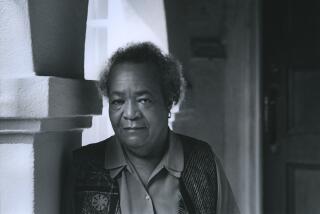Henrietta Lacks’ ‘Immortal’ roots
- Share via
When a freak snowstorm shut down the Memphis, Tenn., airport late last month, Rebecca Skloot’s flight to New York was canceled. So Skloot drove five hours to St. Louis to catch a plane from there. The science journalist had spent 10 years working on her first book, “The Immortal Life of Henrietta Lacks,” and ABC News wanted to talk to her. A little weather wasn’t going to slow her down.
Very little can. Skloot, 37, has the whirlwind energy of someone half her age. And nothing gets her going like the story of Lacks, a woman she never met -- one who has, in fact, been dead for almost 60 years.
Lacks, who died of cervical cancer in 1951, is the source of the HeLa cell line, the first human cells able to reproduce on their own in the laboratory.
By the time of her death, researchers at Johns Hopkins University had been trying for years to find cells with such reproductive properties. Lacks’ cells -- powered by something in her cancer -- were so remarkable that Hopkins shared them with scientists around the globe. A new industry of mass-producing human cells grew up around them.
HeLa cells have been used in experiments for decades, enabling countless scientific discoveries, including the polio vaccine and the discovery of chromosomes. The were blown up with an atom bomb and sent into space.
Still in use, they have been produced at mind-blowing volumes -- enough to wrap around the world three times. They’ve been called immortal. Yet as vitally important as they have been to science, few have thought about their origins.
Skloot first heard the story of the cells as a teenager, learning only that they came from Lacks, an African American woman. She found the information tantalizingly inadequate. At the time, Skloot’s father, Floyd (who is the author of several books about living with brain damage) was severely ill and enrolled in a difficult, frustrating drug trial.
“I think that’s why I latched onto the story,” she says. “My first question was, ‘Does she have any kids? What do her kids think of this?’ ”
As Skloot got older, she veered between science and journalism, eventually landing in a nonfiction graduate writing program. To earn her master’s in fine arts, she needed to produce a manuscript.
“I was in class, and I got out a piece of paper and I wrote at the top ‘Forgotten Women in Science,’ ” she remembers. She planned to do 12 essays. “Number 1, I wrote Henrietta Lacks, and then I was like, hmmm.”
Like the HeLa cells, which grow so readily that they can contaminate everything in a lab, Lacks soon took over Skloot’s project. Every piece of the story opened up new lines of inquiry.
Lacks never knew her cells had been taken by scientists. How had they wound up being mass produced? How have our ideas of medical ethics changed since the HeLa cells sprang to life? How can companies own and profit from a person’s body tissues?
And, most important to Skloot, who was Lacks? How had her death -- and the cells she left behind -- affected her family?
The answers were both troubling and intriguing. It took a quarter century after Lacks’ death for her relatives to learn that her cells had been taken. Poor education, superstition and the shameful history of white doctors using African Americans as unknowing test subjects left the family with the misimpression that Lacks, or a substantial part of her, was somehow still alive, the subject of ongoing research.
By the time Skloot started working on the story, the Lacks family had been repeatedly disappointed by people making empty and misleading promises. When she first reached Lacks’ husband, he said, “I had enough ‘a you people,” and hung up.
Skloot was determined to win the family’s trust. She had one strange, intense phone conversation with Lacks’ daughter Deborah, who then cut off contact.
For the next year, as Skloot did research in the tiny, throwback-poor Virginia tobacco town where Lacks grew up, she kept calling, leaving messages on Deborah’s answering machine. Week after week, Skloot called with new tidbits of information.
“I might do exactly the same thing now,” Skloot observes. “I probably would.”
Deborah, who was listening all along, finally picked up the phone. She become Skloot’s closest contact in the family. Despite many differences, their friendship became essential to the story, and Skloot eventually decided it had to be included in the book. What the two shared was a sense that Skloot could get the story -- and that, once she did, she would have to tell it.
This was not so simple. An early book deal disappeared when her publisher was bought out. In total, she went through three publishing houses, four editors and two agents. Most projects would have died along the way.
Yet Skloot’s enthusiasm always found new and fertile ground. She even participated in publicity planning meetings with her publisher last summer, bringing a bag full of sports jerseys emblazoned with the logo “Team Immortal,” and personalized with cell lines -- ReSk, SiLi -- that reflected the names of those involved.
“I did that!” Skloot chimes. “Because I’m a dork.”
Traditionally in publishing, it isn’t the author’s responsibility to bring gifts to her publisher. Nor is marketing and publicity a writer’s domain.
These days, though, an author who focuses only on her work risks seeing it lost on the desk of an overloaded publicity staffer. As the publishing industry contracts at all levels, writers are increasingly called upon to participate in promotion.
Skloot tapped into her journalism networks to get excerpts and stories about the book placed in O, the Oprah Magazine; Wired; and Smithsonian.
She enthusiastically engaged on Facebook and Twitter. She has been a guest on the public radio interview show “Fresh Air,” and once she made it to New York from St. Louis, she appeared on ABC News with three generations of the Lacks family.
All these efforts have created momentum and buzz. “The Immortal Life of Henrietta Lacks,” released on Feb. 2, went straight to Amazon.com’s bestseller list.
After all the years, the research, the friendships and getting the story out, will Skloot be able to move on?
“There will absolutely be other stories that I fall in love with,” she says, “and I’ll do other books, and I will pour myself into them just as I poured myself into this one, but there will never be another story like this.”
carolyn.kellogg @latimes.com
More to Read
Sign up for our Book Club newsletter
Get the latest news, events and more from the Los Angeles Times Book Club, and help us get L.A. reading and talking.
You may occasionally receive promotional content from the Los Angeles Times.







